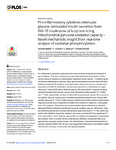Pro-inflammatory cytokines attenuate glucose-stimulated insulin secretion from INS-1E insulinoma cells by restricting mitochondrial pyruvate oxidation capacity - Novel mechanistic insight from real-time analysis of oxidative phosphorylation.
| dc.contributor.author | Barlow, J | |
| dc.contributor.author | Solomon, TPJ | |
| dc.contributor.author | Affourtit, Charles | |
| dc.date.accessioned | 2018-07-11T09:59:02Z | |
| dc.date.issued | 2018-06-28 | |
| dc.identifier.issn | 1932-6203 | |
| dc.identifier.issn | 1932-6203 | |
| dc.identifier.other | ARTN e0199505 | |
| dc.identifier.uri | http://hdl.handle.net/10026.1/11827 | |
| dc.description.abstract |
Pro-inflammatory cytokines cause pancreatic beta cell failure during the development of type 2 diabetes. This beta cell failure associates with mitochondrial dysfunction, but the precise effects of cytokines on mitochondrial respiration remain unclear. To test the hypothesis that pro-inflammatory cytokines impair glucose-stimulated insulin secretion (GSIS) by inhibiting oxidative ATP synthesis, we probed insulin release and real-time mitochondrial respiration in rat INS-1E insulinoma cells that were exposed to a combination of 2 ng/mL interleukin-1-beta and 50 ng/mL interferon-gamma. We show that 24-h exposure to these cytokines dampens both glucose- and pyruvate-stimulated insulin secretion (P < 0.0001 and P < 0.05, respectively), but does not affect KCl-induced insulin release. Mirroring secretory defects, glucose- and pyruvate-stimulated mitochondrial respiration are lowered after cytokine exposure (P < 0.01). Further analysis confirms that cytokine-induced mitochondrial respiratory defects occur irrespective of whether fuel oxidation is coupled to, or uncoupled from, ATP synthesis. These observations demonstrate that pro-inflammatory cytokines attenuate GSIS by restricting mitochondrial pyruvate oxidation capacity. Interleukin-1-beta and interferon-gamma also increase mitochondrial superoxide levels (P < 0.05), which may reinforce the inhibition of pyruvate oxidation, and cause a modest (20%) but significant (P < 0.01) loss of INS-1E cells. Cytokine-induced INS-1E cell failure is insensitive to palmitoleate and linoleate, which is at odds with the cytoprotection offered by unsaturated fatty acids against harm caused by nutrient excess. Our data disclose a mitochondrial mechanism for cytokine-impaired GSIS in INS-1E cells, and suggest that inflammatory and nutrient-related beta cell failure emerge, at least partly, through distinct paths. | |
| dc.format.extent | e0199505-e0199505 | |
| dc.format.medium | Electronic-eCollection | |
| dc.language | en | |
| dc.language.iso | en | |
| dc.publisher | Public Library of Science (PLoS) | |
| dc.subject | Adenosine Triphosphate | |
| dc.subject | Animals | |
| dc.subject | Cell Respiration | |
| dc.subject | Cytokines | |
| dc.subject | Glucose | |
| dc.subject | Insulin | |
| dc.subject | Insulin-Secreting Cells | |
| dc.subject | Insulinoma | |
| dc.subject | Mitochondria | |
| dc.subject | Models, Biological | |
| dc.subject | Oxidation-Reduction | |
| dc.subject | Oxidative Phosphorylation | |
| dc.subject | Palmitates | |
| dc.subject | Pyruvic Acid | |
| dc.subject | Rats | |
| dc.subject | Superoxides | |
| dc.title | Pro-inflammatory cytokines attenuate glucose-stimulated insulin secretion from INS-1E insulinoma cells by restricting mitochondrial pyruvate oxidation capacity - Novel mechanistic insight from real-time analysis of oxidative phosphorylation. | |
| dc.type | journal-article | |
| dc.type | Journal Article | |
| dc.type | Research Support, Non-U.S. Gov't | |
| plymouth.author-url | https://www.ncbi.nlm.nih.gov/pubmed/29953508 | |
| plymouth.issue | 6 | |
| plymouth.volume | 13 | |
| plymouth.publication-status | Published online | |
| plymouth.journal | PLoS One | |
| dc.identifier.doi | 10.1371/journal.pone.0199505 | |
| plymouth.organisational-group | /Plymouth | |
| plymouth.organisational-group | /Plymouth/Faculty of Health | |
| plymouth.organisational-group | /Plymouth/Faculty of Health/School of Biomedical Sciences | |
| plymouth.organisational-group | /Plymouth/REF 2021 Researchers by UoA | |
| plymouth.organisational-group | /Plymouth/REF 2021 Researchers by UoA/UoA01 Clinical Medicine | |
| plymouth.organisational-group | /Plymouth/Research Groups | |
| plymouth.organisational-group | /Plymouth/Research Groups/Institute of Translational and Stratified Medicine (ITSMED) | |
| plymouth.organisational-group | /Plymouth/Research Groups/Institute of Translational and Stratified Medicine (ITSMED)/CBR | |
| plymouth.organisational-group | /Plymouth/Users by role | |
| plymouth.organisational-group | /Plymouth/Users by role/Academics | |
| dc.publisher.place | United States | |
| dcterms.dateAccepted | 2018-06-10 | |
| dc.rights.embargodate | 2018-7-13 | |
| dc.identifier.eissn | 1932-6203 | |
| dc.rights.embargoperiod | No embargo | |
| rioxxterms.versionofrecord | 10.1371/journal.pone.0199505 | |
| rioxxterms.licenseref.uri | http://www.rioxx.net/licenses/all-rights-reserved | |
| rioxxterms.licenseref.startdate | 2018-06-28 | |
| rioxxterms.type | Journal Article/Review | |
| plymouth.funder | Why do pancreatic beta cells waste energy?::MRC |


